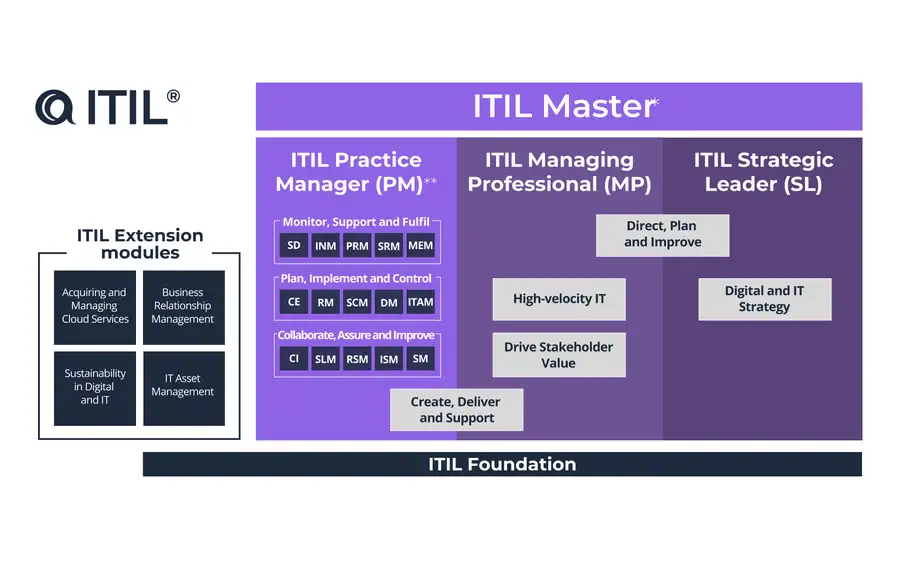What is ITIL?
The Information Technology Infrastructure Library, commonly referred to as ITIL, is a collection of best for managing IT services, recognised globally as the standard for IT Service Management (ITSM).
Its primary objective is to align IT services with business needs and enhance overall service quality for users.
Fundamentally, ITIL serves as a framework offering guidance on effectively designing, delivering, and managing IT services.
Originally developed in the 1980s by the United Kingdom’s Central Computer and Telecommunications Agency (CCTA), it was among the first IT frameworks created to ensure uniform terminology among IT professionals.
The framework encompasses a diverse range of topics, including:
- Service strategy,
- Designing services,
- Achieving service transitions,
- Ensuring operational efficiency, and
- Driving continual improvement.
By adhering to ITIL practices, organisations can guarantee that their IT services are reliable, efficient, and cost-effective.
ITIL4 is a robust framework that builds upon users’ existing information security knowledge. Since its inception, ITIL has undergone numerous revisions to stay aligned with the evolving technological landscape.
The Latest Iteration: ITIL4
ITIL 4, introduced in 2019, represents the most recent iteration of the ITIL framework. It incorporates substantial updates from earlier versions by integrating modern methodologies such as Agile,Ops, and Lean to address needs of evolving digital landscapes. ITIL 4 provides a more cohesive approach to IT service management, enabling organizations to effectively to rapid technological advancements.
ITIL4 Certification Levels
Various certification levels are available to assist professionals and organisations in implementing ITIL4 best practices. These certifications validate an individual’s expertise and proficiency in the ITIL4 framework and are highly valued within the IT. It is important to note that these certification levels differ from those of previous ITIL versions.
Outlined below are the ITIL 4 certification levels:
ITIL 4 Managing Professional (MP)
The Managing Professional certification stream is tailored for IT professionals operating within technology and digital teams. It comprises four modules:
- Create, Deliver and Support: Emphasizes essential service management activities and the development of services for the organisation.
- Drive Stakeholder Value: Addresses the engagement and interaction between service providers and customers.
- High-velocity IT: Investigates the functioning digital organisations and operating in high-velocity.
- Direct, Plan and Improve: Equips practitioners with practical skills to establish a learning and continuously improving IT organisation.
ITIL 4 Strategic Leader (SL)
This certification program designed for individuals in leadership roles or those aspiring to leadership positions. comprises two modules:
ITIL 4 Master
The ITIL4 Master represents the pinnacle of ITIL certification. To attain this prestigious designation, candidates are required to hold Practice Manager, Managing Professional, and Strategic Leader certifications, in addition to being able to demonstrate substantial practical experience in ITIL.
ITIL4 also incorporates extension modules aimed at expanding the ITIL4 framework and addressing emerging trends within the evolving technological landscape.
There are four modules available. These modules are not mandatory certification levels serve as optional resources for candidates to maintain up-to-date ITIL knowledge.

Why Get ITIL 4 Certified?
The ITIL4 certification equips candidates with the most-to-date tools and best practices in IT service management, incorporating modern methodologies such as Agile, DevOps, and Lean IT.
With ITIL4, candidates are better prepared to navigate the fast-evolving digital landscape, enhancing their value to any organisation. ITIL4 provides essential frameworks and practices that benefit organisations across all industries. Consequently, holders of the ITIL4 certification are in high demand. Achieving this certification also demonstrates to employers a commitment to continuous, a highly values skill among professionals.
Benefits of Implementing ITIL for Organisations
Implementing ITIL 4 can bring numerous benefits to organisations of all sizes.
Some of the key advantages include:
- Improved Service Quality: By following ITIL 4 best practices, organizations can deliver more reliable and consistent IT services, leading to higher customer satisfaction.
- Increased Efficiency: ITIL 4 helps streamline IT processes and eliminate unnecessary steps, resulting in more efficient and cost-effective operations.
- Better Alignment with Business Goals: ITIL 4 ensures that IT services are aligned with the needs and objectives of the business, helping organizations achieve their strategic goals.
- Enhanced Risk Management: ITIL 4 provides guidance on identifying and mitigating risks, reducing the likelihood of service disruptions and other IT-related issues.
- Continuous Improvement: ITIL 4 emphasizes the importance of continual service improvement, encouraging organizations to regularly review and enhance their IT services.
Who Manages ITIL?
ITIL was originally developed by the CCTA, which later became part of the Office of Government Commerce (OGC) in the United Kingdom.
Today, Axelos is responsible for maintaining the ITIL framework, ensuring it remains relevant and up-to-date, and promoting its adoption worldwide. They work closely with a global network of accredited training organisations, such as BrightOak, and examination institutes to deliver ITIL training and certification programs to individuals and organisations alike. Axelos was acquired by PeopleCert in 2021, and they work together to ensure the ITIL4 framework remains consistent across the globe.
PeopleCert is an examination institute that provides certification exams for Business, IT and Language topics. PeopleCert works closely with various organisations and training providers globally to ensure that ITIL 4 and other methodologies remain relevant and accessible.
Conclusion: Becoming ITIL4 Certified is a Good Career Move
In the modern digital era, effective IT service management has become increasingly critical. ITIL4 offers a comprehensive framework for IT services, enabling to enhance service quality, boost efficiency and better align IT operations with business objectives. With multiple levels available, ITIL4 also provides valuable opportunities for professionals aiming to advance their careers ITSM.
Governed by Axelos in collaboration with PeopleCert, ITIL continues to evolve and adapt to the industry’s shifting needs, ensuring its ongoing relevance.
Whether you are new to ITIL or seeking to expand your expertise, understanding and applying ITIL best practices can deliver substantial benefits to your organisation and support your success in ever-expanding realm of technology.

